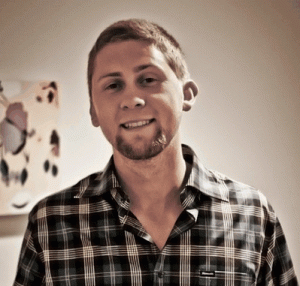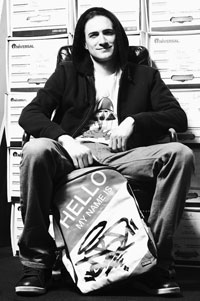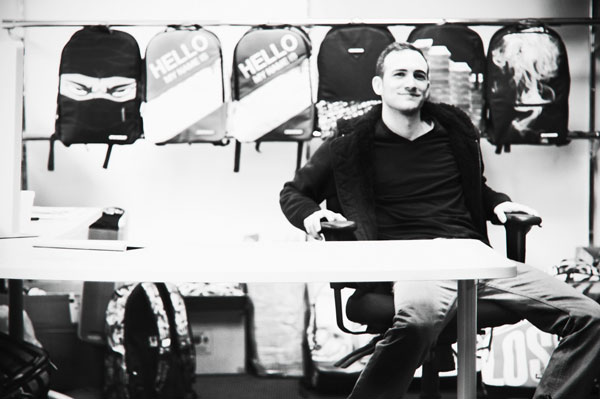Hi Mikey, and welcome! We first got in contact when you pitched me the interview with Sprayground founder and street artist DBD. I always wanted to know who are the people that do marketing through bloggers! So tell us a few words about you.
 Mikey: First, thanks for agreeing to interview with DBD. We appreciate it. Secondly, thanks for inviting me to participate as well. As the principal of my own copywriting and creative consulting firm, extra PR is always welcome. About me – I’m 30 years old, and I’ve been writing professionally for the past nine years. Two years ago, I decided to start my own business after many years of working at agencies.
Mikey: First, thanks for agreeing to interview with DBD. We appreciate it. Secondly, thanks for inviting me to participate as well. As the principal of my own copywriting and creative consulting firm, extra PR is always welcome. About me – I’m 30 years old, and I’ve been writing professionally for the past nine years. Two years ago, I decided to start my own business after many years of working at agencies.
How did you start Paper Rox Scissors?
Mikey: I got bored with the 9-to-5 routine and the internal politics of an office. I never felt I had a future with any of the companies for which I worked. I wanted to be on my own and have the ability to pick and choose my projects. One day, I decided to give up a full-time salary with benefits to take a stab at doing this alone. Two years later, here I am.
What would you say is the main activity of Paper Rox Scissors?
Mikey: From day one, it’s always been copywriting – whether it’s e-mails, websites, advertisements, corporate collateral – you name it – PRS is primarily a copy house. Lately, however, PRS has focused on publicity – that is, getting some of our clients the press they seek to promote their respective brands. Still, there are major copywriting components to publicity. Somebody has to write press releases and pitch e-mails.
Can you name a few clients?
Mikey: Our client roster includes DKNY, Wildlife Habitat Council, North Williamsburg Chiropractic, William Green & Associates, Julia Quinn Productions, Juxster, Club Getaway, Sprayground, and Findmytap, among many others.
A lot of people and companies think they can do their own “online marketing.” When is this true, and when it is not?
Mikey: I think they can, but they have to know who to approach and how to approach them. It’s not as easy as sending an e-mail and getting free press. If that were the case, advertising wouldn’t exist. There’s a lot of trial and error involved in this profession, especially when you’re starting. Patience is also a virtue.
They think what you do is easy. I bet you will say it is not.
Mikey: I’d say yes and no. Personally, what I do is easy for me because it’s my passion. But it’s very time-consuming.
So what would be the advantages of using a specialized agency like yours?
Mikey: We identify the needs of the individual client. Each one gets a personalized plan on how to best market the business – whether it’s corporate collateral, a new website, or public relations.
If you were to do an elevator pitch, what would you say about your company?
Mikey: I would say that I have a home office and no overhead, so my fees are accurate and reasonable – another reason why I left the big agency jobs; the worker’s bees don’t get paid accordingly.
What’s the typical company that is working with you?
Mikey: Primarily, I’m working with small businesses who are just like me – trying to follow their passion, but need a little help here and there. I love working with this type of client because they’re much more open to the ideas we bring to the table.
What is your typical reach when spreading the word for your customers?
Mikey: It depends on the client. I’ve written copy that’s been read by millions, and I’ve written copy that’s been read by two people. It’s what makes the most sense for the client. Targeting the audience it needs and getting the message to them.
What are the main challenges when communicating to the World?
Mikey: Getting people to listen – not just the client, but the editor of the magazine and/or blog, too. We’re all inundated with so many messages, so it’s very important that the ones I write stand out.
You probably have to deal with negative publicity from time to time. What’s the best approach when you have bad publicity online?
Mikey: Bad publicity is relative. If it’s a moral issue, I would likely end my relationship with that client. Anything else, that’s just the way this business goes. No press is bad press, remember – a double entendre that I live by.
By the way, when is the best to do online marketing and when offline?
Mikey: Again, it depends on where that client’s audience is. Our job is to identify that.
How important are blogs in the online marketing process?
Mikey: Extremely important. I never underestimate the power of viral marketing. Even blogs that some would consider small potatoes have very dedicated and loyal readerships. I’d rather reach out to 100 reactive readers than 10,000 nonreactive ones.
What are the main benefits of using bloggers to spread the word about a business?
Mikey: That it’s immediate, forever (until the blog shutters, at least), and searchable. For a retail business, a potential customer can take immediate action to buy that product by clicking on a link that takes him or her to it. I think it’s much more difficult to determine a measurable return on investment with print these days.
Any advice for companies doing their own online marketing?
Mikey: [Laughs] Yes! Hire me.




